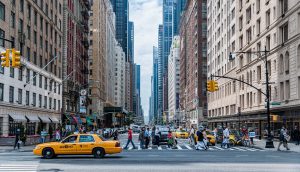


A recent NBER paper, “Distributional Effects of Globalization in Developing Countries,” by Pinelopi Koujianou Goldberg and Nina Pavcnik examines some effects of trade liberalization on low-skill workers.
Les Picker summarizes the findings, “Not surprisingly, the entry of many developing countries into the world market in the last three decades coincides with changes in various measures of inequality in these countries. What is more surprising is that the distributional changes went in the opposite direction from what the conventional wisdom suggests: while trade liberalization was expected to help the less skilled, who are presumed to be the relatively abundant factor in developing countries, there is overwhelming evidence that they are generally not made better off relative to workers with higher skill or education levels.”
There’s a lot more here to digest and the article has some predictably necessary nuances and caveats, not least of which concerns the problematic elements of trying to find a causal link between temporally related phenomena: “The authors’ findings suggest a contemporaneous increase in various measures of globalization and inequality in most developing countries, although establishing a causal link between these two trends has proven more challenging. However, the evidence has provided little support for the conventional wisdom that trade openness in developing countries would favor the less fortunate.”
It’s one thing to say that globalization proportionally rewards more highly educated and skilled workers relative to less educated and skilled workers. This by itself is not obviously unjust, and indeed, it seems to pass a basic sense of justice that jobs that require more skills and training ought mand a higher wage. Maybe a system that distributes more unevenly according to a measure of merit such as education or skill-level is more just than another system which is more equitable in purely distributive terms.
That said, it’s quite another thing to say that low-skilled workers are not made better off in absolute terms by globalization. I’m inclined to think that we shouldn’t be so concerned about relative disparities as we are paring in absolute terms the state of the working poor under systems of liberal versus illiberal trade.
If the working poor are better off under a liberal trade regime than an illiberal one, and higher educated workers are paid relatively more, there is a simultaneous increase in the poor’s immediate economic prospects as well as a relative increase in the economic incentive to improve their skills.
But his latter point only is effective in a situation where labor mobility is a real option, and as the NBER paper points out, “the strict labor market regulation that many developing countries had in place prior to the recent reforms is a potential source of labor market rigidities.”
So, for the promise of globalization to be realized, trade not only needs to be liberalized, but so does labor. Workers need to be free to move between sectors, both within and without national boundaries. As I’ve argued before in another context, we need both free trade and free labor.
For more on international labor mobility among low-skill workers, see this NYT piece, “Short on Labor, Farmers in U.S. Shift to Mexico.” See also, “New UN Report Underscores Ties between Poverty and Productivity.”









